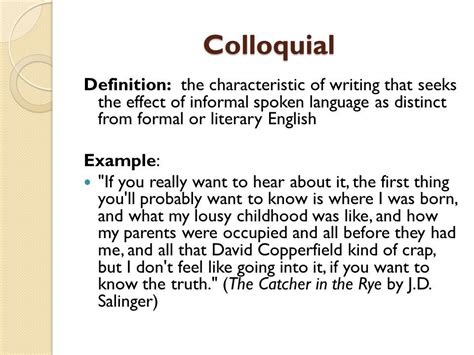In the realm of poetry, traditional syntax and formal language have long held sway. However, contemporary poets are embracing colloquial syntax, the everyday language of speech, to create works that are both relatable and impactful.

Understanding Colloquial Syntax
Colloquial syntax refers to the informal and conversational language used in everyday communication. It often features contractions, slang, and colloquialisms that are not typically found in formal writing.
By utilizing colloquial syntax in poetry, poets can:
- Connect with readers on a personal level by using language that is familiar and accessible.
- Evoke emotions and experiences through the use of everyday speech patterns and idioms.
- Create a sense of authenticity and immediacy in their work by capturing the nuances of everyday language.
Examples of Colloquial Syntax in Poetry
Here are some examples of poems written using colloquial syntax:
- “The Love Song of J. Alfred Prufrock” by T.S. Eliot:
Let us go then, you and I,
When the evening is spread out against the sky
Like a patient etherized upon a table;
- “Do Not Go Gentle into That Good Night” by Dylan Thomas:
Do not go gentle into that good night,
Old age should burn and rave at close of day;
Rage, rage against the dying of the light.
- “Stopping by Woods on a Snowy Evening” by Robert Frost:
Whose woods these are I think I know.
His house is in the village though;
He will not see me stopping here
To watch his woods fill up with snow.
Benefits of Using Colloquial Syntax in Poetry
- Accessibility: Poems written in colloquial syntax are more accessible to a wider audience, as they do not require a deep understanding of formal language.
- Relatability: The use of everyday language helps readers connect with the emotions and experiences expressed in the poems.
- Authenticity: Colloquial syntax allows poets to express themselves in a genuine and unfiltered way.
- Freshness and originality: The departure from traditional syntax can bring a sense of freshness and originality to poetry.
How to Use Colloquial Syntax in Poetry
- Be mindful of your audience: Consider who you are writing for and tailor your language accordingly.
- Use contractions, slang, and idioms: These informal language forms can make your poems more relatable and energetic.
- Capture the rhythm and flow of everyday speech: Pay attention to the way people talk and incorporate those patterns into your poetry.
- Don’t overdo it: While colloquial syntax can be powerful, it should be used sparingly to avoid becoming clunky or awkward.
Conclusion
The use of colloquial syntax in poetry is a powerful tool that allows poets to connect with their readers on a deeper level. By embracing the language of everyday speech, poets can create works that are both relatable and impactful, breaking away from the confines of traditional syntax and breathing new life into the poetic form.
